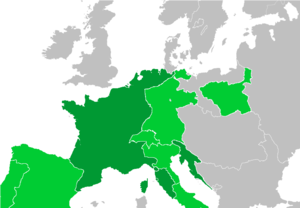1797
Jump to navigation
Jump to search
1787 < 1788 < 1789 < 1790 < 1791 < 1792 < 1793 <1794 < 1795 < 1796 < 1797 > 1798 > 1799 > 1800 > 1801 > 1802 > 1803 > 1804 > 1805 > 1806 > 1807
 France continues to create client states, this year the turn has come to Italy. | |
| year 1799 |
Contents
Events
- January 7 – The parliament of the Cisalpine Republic adopts the Italian green-white-red tricolour as the official flag (this is considered the birth of the flag of Italy).
- January 26 – The Treaty of the Third Partition of Poland is signed in St. Petersburg by the Russian Empire, Austria and the Kingdom of Prussia.
- February 18 – Invasion of Trinidad: Spanish Governor José María Chacón peacefully surrenders the colony of Trinidad to a British naval force, commanded by Sir Ralph Abercromby.
- February 26 – Bank Restriction Act removes the requirement for the Bank of England (the national bank of Great Britain) to convert banknotes into gold - Restriction period lasts until 1821.
- March 4 – John Adams is sworn in as the second President of the United States, with an uneventful transition of power from the administration of George Washington.
- March 5 – Protestant missionaries from the London Missionary Society land in Tahiti, from the Duff (celebrated as Missionary Day in French Polynesia).
- March 21 – Battle of Parramatta: Resistance leader Pemulwuy led a group of aboriginal warriors, estimated to be at least 100, in an attack on a government farm at Toongabbie in Sydney, Australia.[1]
- Veronese Easter: Citizens of Verona, Italy, began an unsuccessful eight-day rebellion against the French occupying forces.
- May 12 – War of the First Coalition: Napoleon Bonaparte conquers Venice, ending the city and Republic of Venice's 1,100 years of independence. The last doge of Venice, Ludovico Manin, steps down. The Venetian Ghetto is thrown open.
- June 29 – Napoleon Bonaparte decrees the birth of the Cisalpine Republic; he appoints ministers and establishes the first constitution.
- July 9 – U.S. Senator William Blount becomes the first federal legislator to be expelled from office, as his fellow Senators vote 25 to 1 to block him from his seat during an investigation against him on charges of criminal conspiracy.
- August 29 – Massacre of Tranent: British troops attack protestors against enforced recruitment into the militia at Tranent, Scotland, killing 12.
- September 4 – The Coup of 18 Fructidor is carried out in France as three of the five members of The Directory, France's executive council, arrested royalist members of the Council of Five Hundred, the national legislature, and discard the results of the spring elections.[2]
- September 5 – France's new government decrees that citizens who left the country without authorization are subject to the death penalty if they return.[3]
- September 30 – Dominique-Vincent Ramel-Nogaret, French finance minister, repudiates two thirds of France's debt.
- October 17 – The Treaty of Campo Formio ends the War of the First Coalition.
- October 18 – The XYZ Affair inflames tensions between France and the United States when American negotiators Charles Cotesworth Pinckney, John Marshall, and Elbridge Gerry meet with French government representatives Jean-Conrad Hottinguer, Pierre Bellamy and Lucien Hauteval and are told that a treaty between France and the U.S. will require payment of a bribe to France's Foreign Minister Charles Talleyrand and a large loan of American cash to France. Pinckney tells people later that his response was "No, no, not a sixpence!"; Hottinguer, Bellamy and Hauteval are referred to, respectively, as "X", "Y" and "Z" in U.S. government reports on the failed negotiations.[4]
- November 16 – The Prussian heir apparent, Frederick William, becomes King of Prussia as Fredrick William III.
Undated
- The secret Lautaro Lodge as the Logia de los Caballeros Racionales ("Lodge of Rational Knights") is founded, perhaps in Cádiz; membership will include many leaders of the Spanish American wars of independence such as Francisco de Miranda, Bernardo O'Higgins and José de San Martín.
Event
| Event | Start | End | Description |
|---|---|---|---|
| French Revolution | 5 May 1789 | 9 November 1799 | Often cited event in world history that has an even more brutal side to it than is usually discussed. |
A Death
| Title | Born | Died | Summary | Description |
|---|---|---|---|---|
| Jeffrey Amherst | 29 January 1717 | 3 August 1797 | Soldier Mass murderer | British soldier, pioneer in biological warfare. |
Many thanks to our Patrons who cover ~2/3 of our hosting bill. Please join them if you can.
References
- ↑ Grassby, Al; Hill, Marji (1988). Six Australian Battlefields. North Ryde: Angus & Robertson. p. 99.
- ↑ Vincent, K. Steven (2011). Benjamin Constant and the Birth of French Liberalism. Springer. pp. 81–82.
- ↑ Andress, David (2015). The Oxford Handbook of the French Revolution. Oxford University Press.
- ↑ Manweller, Mathew (2012). Chronology of the U.S. Presidency. ABC-CLIO. p. 57.